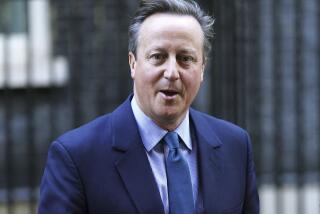Tories Fear Losses From Howe Move : Britain: His resignation as deputy prime minister leaves the party’s position on Europe in confusion. Conservatives believe they may suffer at the polls.
- Share via
LONDON — Britain’s Conservative Party on Friday sought to put a brave face on the resignation of Deputy Prime Minister Geoffrey Howe, leaving the party’s position on joining Europe in a state of doubt and confusion.
Many Conservatives believe that Howe’s resignation Thursday in protest against Prime Minister Margaret Thatcher’s renunciation of a common European currency will seriously damage them in the next general election.
As the conservative Evening Standard pointed out Friday afternoon: “To lose a deputy prime minister over Europe is a catastrophe.” The newspaper added: “Nothing loses elections faster than a party that is manifestly divided at the very top.”
The loss of Howe in his other role as leader of the House of Commons was stemmed Friday when Thatcher hastily appointed Education Minister John MacGregor to the job. She also moved Health Minister Kenneth Clarke to education and junior Foreign Minister William Waldegrave to the health post.
The new ministers insisted that the government is not in disarray over the European issue. They were joined in that assessment by Foreign Secretary Douglas Hurd and Chancellor of the Exchequer John Major, both of whom are leading supporters of Britain’s closer integration in Europe.
However, critics pointed out that it was the fifth time this year that Thatcher has shuffled her Cabinet, calling it a signal of increasing dissatisfaction with her authoritarian style of leadership.
The row over Britain’s approach to the 12-nation European Community began at the group’s summit in Rome last weekend when Thatcher, after having seemed more conciliatory toward her neighbors at the previous summit, balked. She opposed a federal political union in Europe, a central bank and a common currency, but was outvoted on these issues 11 to 1.
Rather than reassessing the British position, or trying to work out a compromise approach for another summit next month, Thatcher and her personal aides launched a campaign against other European nations.
They singled out France and Germany for not agreeing on cuts in farm subsidies and criticized the Italians for mishandling various ministerial meetings during Rome’s current presidency of the European Community.
Thatcher’s aides had some pertinent points to make about the lack of specifics in the EC proposals and the illogic of setting timetables for political and monetary union before it is clear what exactly is at stake.
But they seemed to go out of their way to make biting comments about fellow European Community leaders, with a top Thatcher aide calling the proposals “ragbag” and the summit itself “an undignified mess.”
The aide declared heatedly: “She finds unacceptable the way the EC conducts gang negotiating positions.”
More to Read
Sign up for Essential California
The most important California stories and recommendations in your inbox every morning.
You may occasionally receive promotional content from the Los Angeles Times.













